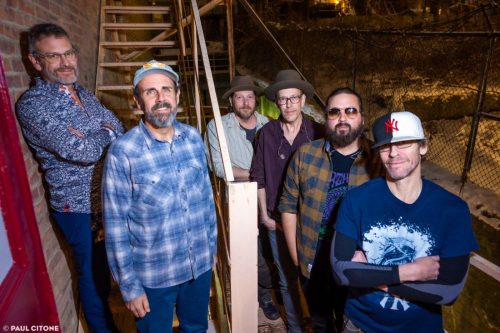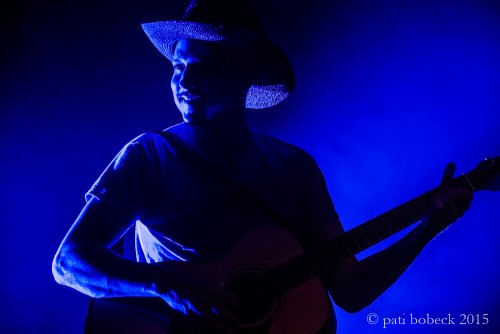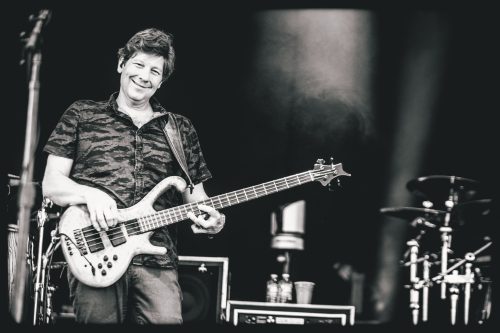The upstate New York jam band moe. has been spreading joy to its legions of fans for 35 years. However, the events of the past few years have threatened to extinguish that joy. Bassist and singer Rob Derhak was diagnosed with cancer in 2017, forcing the band to step away from touring. After Derhak’s recovery, guitarist Chuck Garvey had a stroke in 2021. Last year, Derhak’s son died.
Now, moe. is entering a new era with a refreshed lineup (Nate Wilson has joined on keyboards and guitars after helping fill in for Garvey), a new album called “Circle of Giants” and the scars of the recent past.
“Well, it’s definitely brought us brought us closer together,” drummer Vinnie Amico said. “I mean, we’re a family. We’re a marriage, basically. You have to be there to support each other in this stuff when it happens. If someone goes down, you have to support them to pick them back up, you know? And we’ve had plenty of that over the last few years.
moe. launched its tour in support of “Circle of Giants” last month in Bearsville, NY, and is currently playing dates in California before working its way back east, including a gig in Montclair, NJ, on Feb. 27 and two nights in Philadelphia at Brooklyn Bowl (Feb. 28 and March 1).
We talked with Amico about the new album, how the band approaches its recorded work and live shows as separate endeavors and how moe. has leaned into its love of classic rock.
moe. has always been a two-guitar, classic rock-driven band, but “Circle of Giants” seems to really be rooted in that sound more than ever.
We’re all classic rock guys because we were all born in the late ’60s, grew up in the ’70s and ’80s. So that’s in upstate New York, most of us. So it’s just like, that’s classic rock. So we all have that influence as it is. But with Nate joining, he’s very classic rock sort of influenced as well. And, you know, he had a few songs on this record. I think probably part of it is him. He brings that sort of classic rock ethos to the band, you know? And it’s like, believe it or not, it’s probably in some ways maybe a little maturity in some of our writing.
Speaking of classic rock, the album opens with Nate’s song “Yellow Tigers,” which is based on some Black Sabbath-esque guitar riffs. Was it important to feature him early?
We had been playing the song [live] and it’s a great song, and so it kind of fit, you know? And I mean he’s a great musician who brings a lot to the table. So I think, you know, of course we’re going to put some features in with him. And yes, we haven’t had a keyboard player, but the music kind of warrants it. So, yeah, now that he’s here, we can feature him as part of that a little bit more.
Some groups attempt to recreate their albums note for note in their concerts, but that’s not how moe. operates. What is your goal in making albums vs. playing the songs on stage?
We always seek to separate our live from our studio. We we enjoy getting in the studio and making albums. I don’t think we’re really ever trying to go for our live sound; we want to make the best album we can. So I know that on one of the albums, the producer we had and/or the engineer wanted to capture our live sound, because that’s what we do. Which was fine. And, you know, we probably did. And if you listen to our albums versus our live shows, the songs stayed fairly the same. It’s just that we blow them out and play them longer and have sections that go for a while. And more improvising. And then a lot of segue-ing in between the songs — it gets pretty improv-heavy. The songs aren’t that far off, but it’s not really what we’re trying to do. We actually like to make albums. We’re not trying to capture our live sound. Everybody knows what we sound like live. We want to go put our music down and make it the best it can be.
What was the state of the band after Chuck had a stroke?
There was always that thought that he might not recover. There’s always that chance. And it was weird. We had Suke [Cerulo] playing guitars. Great guitar player. But it was still kind of like you’d hear Phantom Chuck, like if you lost a limb and you still feel like you have your limb there. That was definitely happening quite a bit, where there’d be a spot where Suke would solo and it wasn’t what Chuck would do. You hear Chuck, you just hear his parts, and it kind of guides you through the song in some ways, you know? So yeah, we definitely could hear him even though he wasn’t there, you know what I mean?
And yes, there was always a thought that, oh God, what happens if he doesn’t recover and can’t play, you know? But he’s playing his ass off.
moe. spent its early years building to the level you’ve been at for decades, where you can consistently play theaters and larger clubs. How hard is it to maintain that success?
I think it’s harder, actually. I mean, a lot of people have an upward trajectory and then they hit a peak and then they kind of start coming down. We’ve kind of hit a peak and stayed up there. I mean, you see some little drop-offs here and there, but we’ve tried to maintain our career where it is, and it’s not easy. And it gets harder and harder because everything gets more and more expensive. You know, busing, trucking, labor, food, you know, and we don’t make a ton more money, everybody else gets paid more. From a business standpoint it’s hard, but I mean, even to keep your music fresh or just keep it going, keep writing new music, because that’s ultimately what keeps fans coming. … So you just have to keep creating and keep getting better, keep doing things differently. You got to keep it fresh, or people just are like “fuck it,” you know?




Leave a Reply